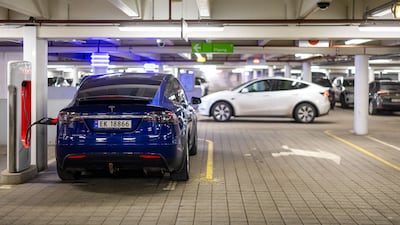It's rare to see victory laps being taken in the fight against climate change but guests at a €660 ($687) a head electric vehicle bash in Oslo this spring are told it will be "time to celebrate" a national milestone.
Guests from International Energy Agency chief Fatih Birol to prominent guitarist Happy Tom will, if predictions come true, hear how Norway has become the first country to sell only electric cars new. The 2025 target was once thought "utter madness" but now "we are confident that we will reach the goal", a brochure says.
The rise has been rapid. In 2010, fewer than one in 350 new cars sold in Norway was electric. By 2020 it was a majority, and in 2024 zero-emission cars made up 88 per cent of new sales. A new electric Toyota Urban Cruiser is tipped to lead the final push for 100 per cent, squeezing out its last petrol stablemate.
"This car will be very important in reaching 100 per cent electric car sales in Norway," according to Rune Nesheim of Norway's Electric Vehicle Association, who said Toyota dominates what remains of petrol car sales. Even a small Yaris "will appear unnaturally expensive next to the Urban Cruiser", he said.
Chinese cars have also begun to penetrate the market as Norway takes a more relaxed view than EU neighbours on the threat to Europe's auto industry. Chinese-owned brands such as MG, BYD and XPeng boosted sales in Norway by two thirds in 2024 while market leaders Tesla saw a slight drop.
How has Norway done it? One reason is that Norway's oil and gas revenue pays for tax incentives, such as a VAT exemption for electric cars unless they are worth more than 500,000 crowns ($44,000). There is a carbon tax on oil, and a surplus of electricity to go around thanks to Norway's hydroelectric dams.
The tax breaks will cost the government an estimated 50 billion crowns ($4.41 billion) in 2025, but its fossil fuel revenue will be much higher. The government's "main goal remains to ensure that choosing an EV is an attractive and economically viable choice for consumers", the Transport Ministry says.
Norway's public sector has been required to buy electric since 2022, and battery-powered cars are often allowed to drive in bus lanes. And Norwegian roads have more than 9,000 electric charging points, again putting them top of the league in Europe.

European downturn
It is not that electric cars are enjoying a boom across Europe. "The honest assessment must be that the transition is not going to plan", said Luca de Meo, the head of the European Automobile Manufacturers’ Association. In its latest monthly figures, battery-powered vehicle sales were down 5.4 per cent year on year.
The drop was especially stark in the European Union's two biggest markets, Germany and France, which both saw a decline of more than 20 per cent in battery-electric vehicle registrations. The electric market share across the EU (Norway is not a member) was just 13.4 per cent, another clear fall.
The Nordic countries dominate Europe's electric car league table, with the Netherlands, Belgium and Romania also scoring highly. Germany and France have the most in absolute terms but are in the middle of the pack when ranked by percentage of electric car sales. The flagship German car industry is under threat from cheap Chinese models and a limp economy is also blamed for the downturn.
Four rounds of strikes at Volkswagen have added to a German winter of discontent as the company considers closing factories in its native country for the first time. There are uncertainties to be ironed out about whether EU rules kicking in from 2035 will allow the burning of synthetic fuels, or just batteries.
Manufacturers "have pledged €250 billion ($259.68 billion) into the green mobility transition and, just like everyone else, we want this to succeed", Mr De Meo said. He said they risk losing €16 billion ($16.61 billion) by selling cars at a lost or paying penalties for missed EU targets.
Norway is less concerned though because its cars are not manufactured at home and sees no need to follow the EU in imposing tariffs on Chinese cars. Prime Minister Jonas Gahr Store spoke of "opportunities for co-operation between our environmental industries" on an autumn visit to Beijing.
Still, not everybody in Norway is happy. The right-wing Progress Party, which has leapt to the top of opinion polls before a 2025 election, is pressing for sales of petrol and diesel-powered cars to continue. "We will not force drivers to buy cars that do not work for them," its transport policy spokesman Frank Sve said.
The party wants to halve the tax on fuel that ministers credit with boosting electric vehicle sales. Although electric cars were the overwhelming majority of new models sold in 2024, they are only 29 per cent of all the cars on Norway's roads.

Norway is a major oil and gas exporter and intends to remain one, which has opened up its electric vehicle drive to accusations of greenwashing. Despite its green motoring, Norway's per capita greenhouse gas emissions are higher than those of France, Spain, Portugal or Sweden.
Activists at the recent Cop29 climate summit in Azerbaijan put Norway in the same boat as the UN and Russia as they condemned it for issuing new drilling licenses in the Arctic. Others say the government can go further still on electric cars. A left-wing party that tolerates Mr Store's government wants an additional tax break on the sale of used electric vehicles.
But there are parts of Norway where the 100 per cent target has already been reached. They include fairly remote northern areas far away from Oslo, showing that fears of batteries running out in rural areas are "simply wrong", according to the Electric Vehicle Association.
At the Oslo summit in April "we will take stock and ask how on earth did we do it, and how fast can the rest of the world follow?", organisers say. "And let’s not forget: It is time to celebrate!".


